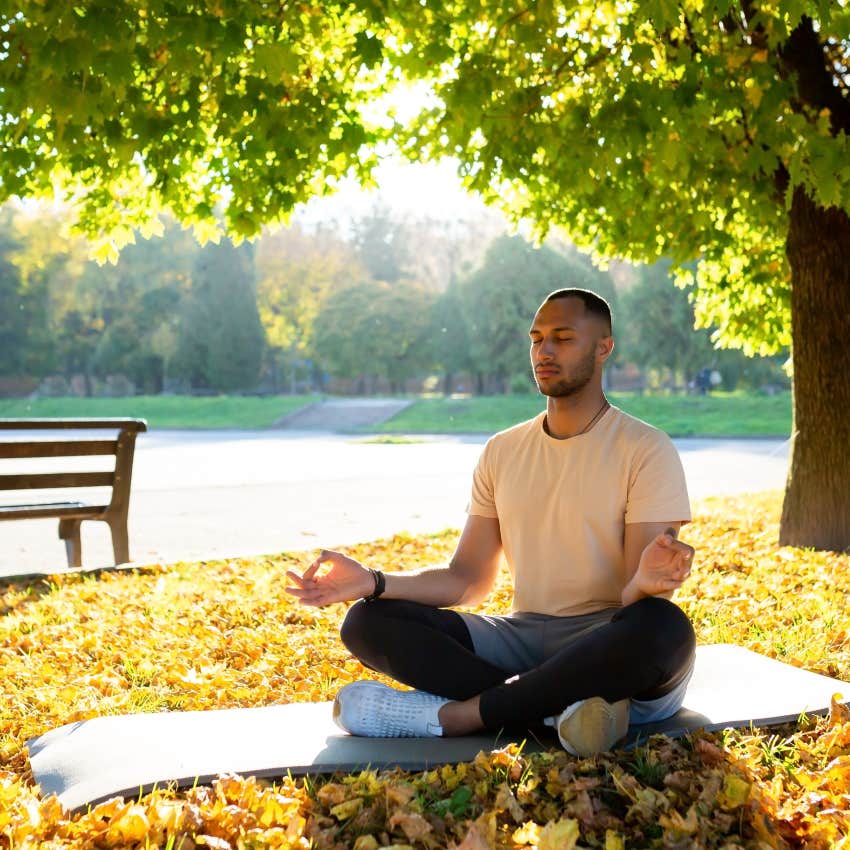6 Ways To Harness Your Anger If You Find It Controlling Your Life
Enjoy a calmer, more effective existence without anger taking over.
 Dean Drobot | Canva
Dean Drobot | Canva I used to be a hothead, which rendered me pretty useless in those moments. My dad used to call it ‘throwing a wobbler.’ I’d throw stuff across the room if I was really upset. I could grit my teeth and yell hurtful things before slamming the door to my bedroom.
That was in my younger days; my anger rarely flares up today. But I know how painful it can be to have life disrupted by anger. It sits dormant, often, and then reveals itself when triggered, perhaps after months of bottling it up.
Here are 6 ways to harness your anger if you find it controlling your life:
1. See how anger is showing you what you value.
Like any form of passionate emotion, anger can show us some interesting things about ourselves. We can often shame ourselves into thinking that feeling angry or fearful means there’s something wrong with us. And we fail to look further into understanding it. But understanding is healing. It diminishes anger.
When we get angry and then ask why, we get answers. It shows you what you value highly. Did you get angry about being disrespected? You value respect, and that’s healthy. So give yourself credit.
When you can understand more about what you value, which is good when you are angry, compassion and logic begin to diminish the red cloud of rage. Maybe you can even use your past rages to point you toward your passions worth pursuing.
2. Ask how you can use this.
When you get angry, try to calm down as soon as you can. Once you have, you can ask: ‘What is this anger giving me?’ or ‘How can I use this anger?’
Anger gives you a couple of things:
- It shows you what you value and what may need to change in your life.
- Anger is there to give you an assertive energy, which is the energy of getting things done.
What can you get from your anger that will change your life for the better? Maybe it’s time to make a significant habit change. Or maybe this is a time to go for long daily walks. There is always positive potential to unearth within the dark pits of anger.
3. Use attention to melt stuck anger.
We all have the power to conjure up emotional associations with thoughts at will. When we ask the right questions, we can think of something that brings back feelings of resistance, anger, or sadness.
In the case of your anger, ask yourself: ‘What’s stopping me from being completely happy with myself?’ Or: ‘What anger do I still hold on to?’
Ask the question, and then observe your physical sensations. You may find feelings of resistance, blocks, or pressure in the body.
For example, you might feel some anger show up in the chest or belly. Observe these sensations. Watch as they literally melt away before you. Attention always cancels out stuck emotions.
It’s like the body wants you to acknowledge it, and when you do, it has no longer any reason to ‘show you’ these stuck emotions. You can literally heal yourself of pent-up anger through sessions like these, and the impact is as instant as it seems.
Repeatedly slap yourself. Walk to a mirror and say ‘I’ve been a big old idiot’ three times before slapping yourself hard across the face ten times. This is a joke. Don’t do this. You need to find your compassionate self.
4. Meditate like a monk with a desire for presence.
Meditation is similar to point three, but in this case, we’re practicing using the muscle of awareness.
Most of us go through our days wrapped in thoughts, most of them highly self-critical. This is like putting a tiger in a cage for years and repeatedly prodding it. This does not make for a happy kitty.
You are the same. Use meditation to cool your mind and find insights and compassionate thoughts. They are there when we allow the mind to still. Don’t be a plonker repeatedly saying affirmations. OK, you can — there’s no harm in it.
But the real gold is awareness. Research shows awareness and mindfulness are like bringing a healing ointment to emotional imbalance. Your anger will fade when you meditate with some consistency.
 voronaman | Shutterstock
voronaman | Shutterstock
5. Don’t numb yourself with things you know aren’t good for you.
Millions of men have run to drink, drugs, TV, or other forms of stimulation to escape the pain of emotions they don’t like. Don’t fall into this trap. Now is the time to feel more fully, not to cover it up like a tarp over a pile of dung. Instead, simplify and connect with yourself and nature.
Go for regular walks. Eat cleaner, non-processed food. Socialize. Get back into creative hobbies. Do more to be more conscious.
Alcohol, for example, is directly the opposite. It lowers your consciousness, making you even more susceptible to bouts of anger and emotional chaos. Reconnect.
6. Journal on the beliefs that hold you in anger.
Humans harbor many beliefs about the world and who we think we are. Most of these beliefs are lies and make us feel bad.
We need to see things for what they really are. When we don’t, we risk falling into a lack of emotional control, just like I did when I was a little boy. You’re not a little boy, are you?
So we must discharge the emotion from false beliefs. You can get out a pen and paper or do this by reflection alone. Ask yourself, ‘What’s the thought that comes up about who I am when I get angry?’
Write it down. We often get angry because some belief about ourselves has been activated. It could be, for example, that you get triggered when someone criticizes you. And the thought is something like ‘I’m not a very charismatic person.’ (example).
By thinking this, you get angry. So, we need to question the validity of such a belief: Is it true? Who am I with the thought? How do I feel? Who am I without the thought?
Imagine you could literally delete that thought from your brain — what would your life look like, and how would you feel? Very likely, you wouldn’t get angry or it would be significantly diminished. Then you need to find as many pieces of real evidence to support the opposite of that belief, i.e.: ‘I am a very charismatic person.’
When the evidence is there, the belief loses hold on you. And when a belief means LESS to you, the anger attached to it will whither and die.
Alex Mathers is a writer and coach who helps you build a money-making personal brand with your knowledge and skills while staying mentally resilient.

